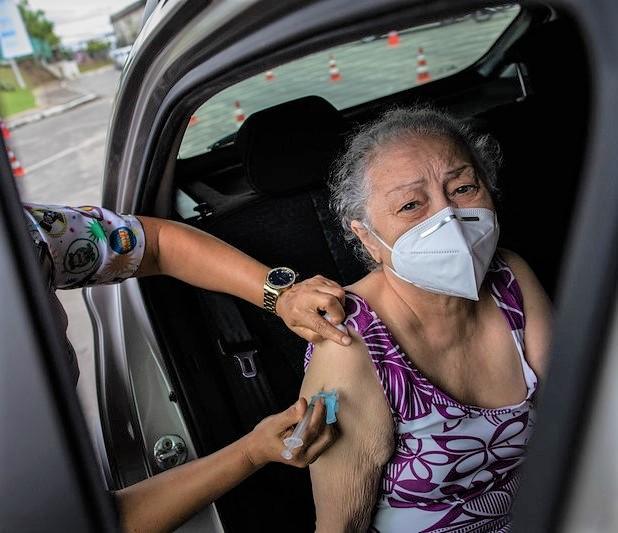Two studies yesterday in The Lancet Infectious Diseases confirm that COVID-19 vaccination confers substantial added protection—particularly against severe illness—to those previously infected with the virus.
In the first study, researchers in Brazil used a test-negative design to evaluate the effect of the CoronaVac, AstraZeneca/Oxford, Johnson & Johnson (J&J), and Pfizer/BioNTech COVID-19 vaccines in 30,910 people reinfected with COVID-19 and 145,055 uninfected controls. The study period was Feb 24, 2020, to Nov 11, 2021, a period that included the Delta variant surge but before Omicron.
Vaccine effectiveness (VE) against symptomatic infection in COVID-19 survivors at least 14 days after vaccine series completion was 39.4% for CoronaVac, 56.0% for AstraZeneca, 44.0% for J&J, and 64.8% for Pfizer. VE against hospitalization or death was 81.3% for CoronaVac, 89.9% for AstraZeneca, 57.7% for J&J, and 89.7% for Pfizer.
VE against symptomatic infection was significantly higher after the second dose of the CoronaVac, AstraZeneca, and Pfizer vaccines than after the first dose (primary vaccination with J&J is one dose).
"Understanding the duration and effectiveness of immunity for those vaccinated with a previous COVID-19 diagnosis becomes increasingly important as the pandemic progresses and surges in new cases may occur as a result of more transmissible variants," study coauthor Julio Croda, MD, PhD, of the Secretary of Health Surveillance in Brazil, said in a Lancet press release.
"There has been ongoing public debate about whether previously infected individuals need to be vaccinated," he said. "Our results suggest that vaccine benefits far outweigh any potential risk and support the case for vaccination."
87% lower risk of hospitalization
In the second study, Umea University researchers retrospectively mined national data on 2,039,106 unvaccinated Swedish COVID-19 survivors matched to unvaccinated coronavirus-naïve residents (cohort 1) and recipients of one (2,962,318 people) or two (3,567,810) COVID-19 vaccine doses after previous infection (cohorts 2 and 3, respectively). Infections occurring from Mar 20, 2020, to Oct 4, 2021, and hospitalizations from Mar 30, 2020, to Sep 5, 2021, were included.
Over an average follow-up of 164 days, 34,090 COVID-19 survivors in cohort 1 were reinfected with, compared with 99,168 infections in coronavirus-naive participants; 3,195 and 1,976, respectively, were hospitalized.
After 3 months, previous COVID-19 infection was tied to a 95% lower risk of reinfection (adjusted hazard ratio [aHR], 0.05) and an 87% (aHR, 0.13) lower risk of hospitalization for up to 20 months.
Over an average follow-up of 52 days, 639 COVID-19 survivors in cohort 2 who received 1 vaccine dose were reinfected (8 were hospitalized), compared with 1,662 and 113 unvaccinated survivors, respectively. One-dose in this group was linked to a 58% lower risk of reinfection (aHR, 0.42) than previous infection for up to 2 months, with signs of waning thereafter up to 9 months.
During an average follow-up of 66 days, 438 COVID-19 survivors who received 2 vaccine doses were reinfected, and 6 were hospitalized, compared with 808 and 40 unvaccinated survivors, respectively. Two doses in this group were associated with a 66% lower risk of reinfection (aHR, 0.34) than among unvaccinated survivors, with no significant waning to 9 months. To prevent one reinfection in COVID-19 survivors during follow-up, 767 people needed to receive two doses.
"These findings suggest that any passports used for societal restrictions could consider either a previous infection or vaccination as proof of immunity, as opposed to vaccination only," co-lead author Anna Nordstrom, MD, PhD, said in the release.

















